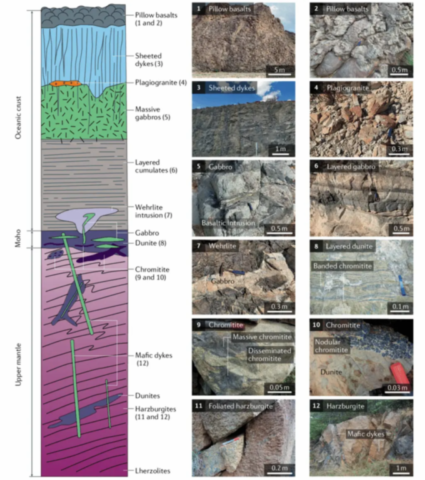What is an ophiolite in geology ?
A piece of oceanic crust
The concept of an ophiolite complex :
Typical structure of an ophiolitic complex :
- Foliated peridotites (Harzburgites) and chromite
The deepest layer of an ophiolite complex consists of foliated peridotites, especially harzburgites, which are rich in olivine and pyroxene. These rocks form the upper part of the Earth's mantle and are evidence of the high pressure and temperature conditions found in subduction zones. Depending on the local geology, chromite deposits may also be present, indicating mantle differentiation processes. - Gabbros and layered cumulate peridotites
Above the peridotites are gabbros, rocks rich in plagioclase and pyroxene. The latter form from magma that has crystallized at moderate depths. The transition from gabbros to layered cumulate peridotites, such as dunites and lherzolites, is also common in ophiolite complexes. These rocks are the result of the fractional crystallization of oceanic magma and provide evidence of magmatic processes in the oceanic crust. - Basalts and sedimentary layer
The upper layers of ophiolitic complexes are dominated by basalts, initially vein basalts and later pillow basalts (or "pillow lavas"). These formations are characteristic of submarine volcanic eruptions, where magma, upon contact with seawater, rapidly solidifies into spherical or pillow formations. Pillow basalts represent the most superficial layer of the oceanic crust. Above this is a thin layer of oceanic sediments, which may consist of various sedimentary rocks such as clays, carbonates and silts, reflecting depositional conditions in shallow oceanic environments.
Metamorphism of ophiolites :
At low metamorphic grade, basalts are transformed into greenschists, characterized by the appearance of chlorite, actinolite and epidote. When pressure and temperature increase, a transition to the amphibolite facies is observed, marked by recrystallization into hornblende and plagioclase, while peridotites can evolve into serpentinites under the effect of hydration.
In a deep subduction context, ophiolites can reach the eclogite facies, where metamorphosed gabbros and basalts present garnets and jadeite, indicating high pressure conditions. Peridotites can evolve into garnet and olivine rocks.
Finally, during the obduction process, where ophiolites are stacked on the continental crust, a retromorphosis can occur, partially rehydrating the minerals and promoting recrystallization into blueschists or even greenschists, depending on the intensity of the metamorphic rebalancing. These transformations make it possible to trace the tectonic history of ophiolites and their migration from the ocean floor to current mountain ranges.

